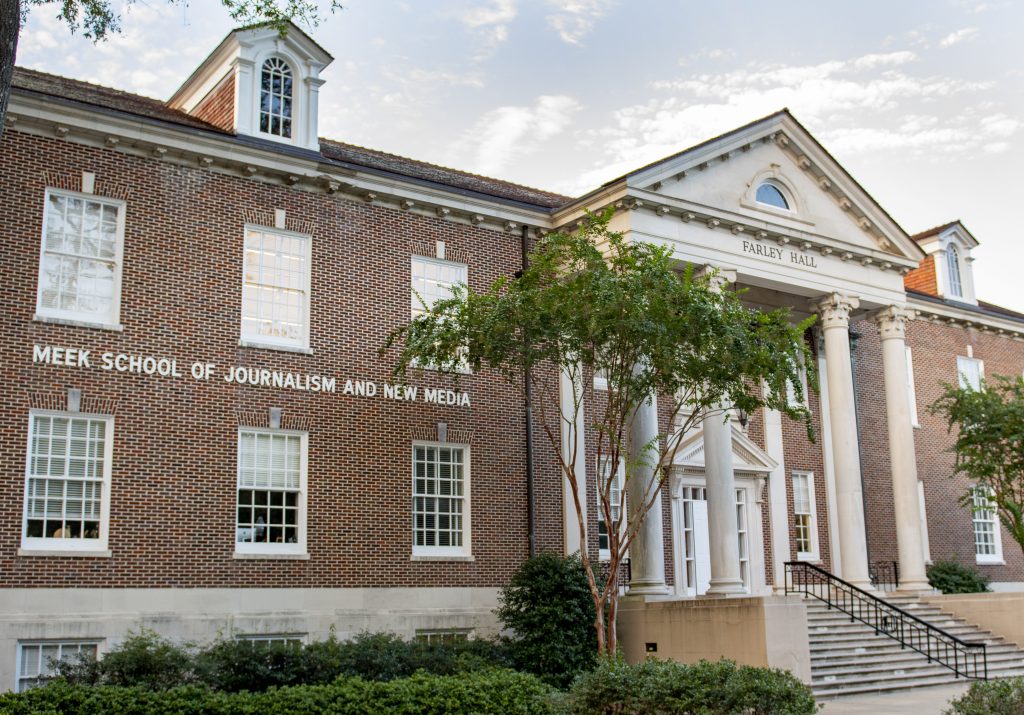The state Institutions of Higher Learning will discuss removing Ed Meek’s name from Ole Miss’ journalism school at its board of trustees meeting Thursday morning.
According to the IHL’s agenda for Thursday’s meeting, the board will consider the removal of Meek’s name from the Meek School of Journalism and New Media as a request from the University of Mississippi. The Oct. 18 Board Book shows that “Board staff recommends approval” of the request.

Ed Meek, the namesake of the Meek School of Journalism and New Media, has requested his name be removed from the school, following controversy around a now-deleted post on his Facebook page. Photo by Christian Johnson
Ole Miss Chancellor Jeffrey Vitter said in a statement on Oct. 9 that he had submitted the proposed name change to the IHL board after the proposal had cleared all administrative steps on campus.
“The faculty in the school voted to approve a request made by Dr. Ed Meek to remove his name from the school,” Vitter said. “The proposal was subsequently approved by the Undergraduate Council, the Graduate Council and the Council of Academic Administrators. Shortly thereafter, I submitted the proposal to the IHL Board for expedited consideration at its October meeting.”
The potential IHL vote comes nearly one month after Meek complained about problems facing Oxford and the Ole Miss community in a post on his Facebook page attached to photos of two female African-American students.
“Enough, Oxford and Ole Miss leaders, get on top of this before it too late,” Meek wrote in his post attached to the two photos. “A 3 percent decline in enrollment is nothing compared to what we see if this continues…. and real estate values will plummet as well as tax revenue.”
On Sept. 22, Meek requested that the university remove his name from the School of Journalism and New Media after journalism and new media faculty members called for Meek to request the university remove his name.
Since Meek’s request, a group of more than 100 of UM professors, students and staff members have called for Meek’s name to be removed and for the journalism school to be renamed for anti-lynching activist and investigative reporter Ida B. Wells-Barnett.

Michelle Duster, great-granddaughter of anti-racism activist Ida B. Wells-Barnett, works as an author and teacher in Chicago. She said she supports the calls for Ole Miss to honor her great-grandmother as the new namesake for the Meek School of Journalism and New Media. Photo courtesy: Philip Dembinski
Wells-Barnett’s great-granddaughter, Michelle Duster, said it would be fitting for the journalism school to be named after Wells-Barnett.
“She was a native Mississippian who was a trailblazer in the field,” Duster wrote in a statement to The Daily Mississippian. “She used investigative journalism as a tool to expose injustice, inequality and domestic terrorism in a way that challenged the power structure of our country. Despite the fact that she faced great danger and her printing press was destroyed, she never backed down from documenting facts and telling the truth. Her contribution to journalism is immeasurable and should be an inspiration and model for all who study the field.”
Follow thedmonline.com and The Daily Mississippian’s social media accounts for coverage of the meeting throughout the day.






